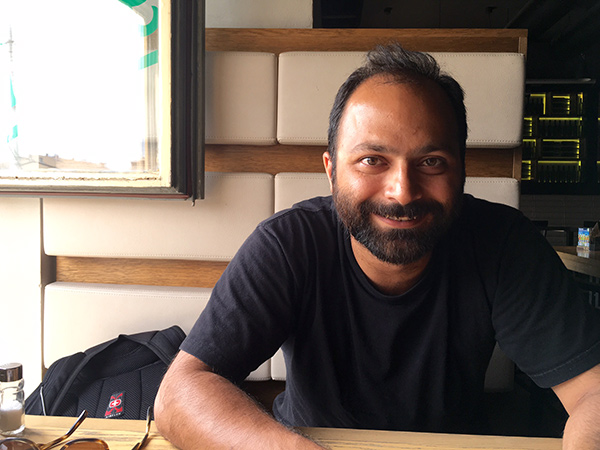While Iranian-Canadian composer Ashkan Behzadi describes his first pieces as “immature and naïve,” the same certainly can’t be said about his current output. His works have been played by groups around the world, including theOerknal Ensemble and the TAK ensemble,and most recently, he’s been named a finalist in the Graham Sommer Competition for Young Composers.
Ashkan’s exploration of composition began at the age of 13, when his piano teacher at the time encouraged him to write more and more. Eventually, he began to learn more about the compositional processes of some of his favourite composers, and after studying and imitating the compositional styles of Bach, Debussy and Rachmaninov, it was the work of Bartok that ultimately motivated him to take formal lessons in composition. Later, he decided to follow composition as a career and pursue the topic in university, studying at McGill University’s Schulich School of Music and currently as a doctoral candidate at Columbia University. However, before this, he completed a Bachelor of Architecture in Tehran.
While reflecting on this time in his life, he explained that he only has vague memories of his studies in architecture. “When I looked at my old sketches and school works, it surprised me how I used to design buildings,” Ashkan describes. “However, looking from a theoretical perspective, I think the process of composition is quite similar to the process of designing a building – the ensemble can be seen as your landscape! Like an architect, you also start with sketches while composing, and as soon as you have a general idea of what you are constructing, you delve into the details of your construction. Working with details, and the quality of your engagement with them are in fact the essential part of your creative process that gives shape to the overarching form of your final product. Also, both as an architect and a composer, you’re often forced to deal with a series of practical issues and serious limitations that demand similar attention.”
It’s not uncommon for composers to cite their ethnicity as having influenced their work, and on this subject, Ashkan explained that he tries not to get too concerned about the representation of non-musical ideas in his compositions. “If I got preoccupied with whether or not my music can or should be a spectacle for representing either my cultural or national identity, I would lose my intimate relationship with the material of my work, as well as my closeness to the musical texture of my craft. This realization has led me to move further and further away from any unmediated incorporation of extra-musical material and matters into my work, and instead, to move deeper and deeper into ‘thinking inside the music’ or into the ‘immanent problems of form,’ as Theodor Adorno has put it. So, as far as the issues of identity politics, borders and boundaries are concerned, what’s at stake for me is the changing nature of the identity and boundaries that have signified the genre of music historically and traditionally.”
“Having said that, I’m also aware of the fact that the idea of ‘thinking inside music’ can have its own pitfalls and limitations unless its principles are carefully distinguished from that of the l’art pour l’art. To me, it seems obvious that as a composer, you constantly need to reflect on the meaning and truth-content of your work, and you need to critically evaluate the alienation that is inherent in your role as a composer. As someone who produces an object to be performed by someone else, and to be consumed by someone else in the setting of a concert hall or recording, you also need to have a firm grasp of the relationship of production and consumption in the world we live in. As a result, the term ‘thinking inside the music’ emphasizes that in every meaningful musical composition, there can be found several moments of critical reflection on the situations that have enclosed the conditions of possibility and impossibility of the genre of music at that particular historical moment. The term, however, also emphasizes that this peculiar form of thinking is embedded in the experiential force of the work, or in other words, can only be rediscovered through a succinct critique of different set of tools, techniques, or musical formulas and arrangements that a composer has utilized to design a musical piece.”
Besides his activities in the Graham Sommer Competition, Ashkan’s other upcoming works include a Gaelic art song project, a piece for Trio K/D/M for accordion and two percussions, a possible clarinet chamber concerto for the Oerknal Ensemble and an hour-long song cycle on a selection of modern Persian love-lyric poetry for soprano and violin.
Listen to a selection of Ashkan's compositions on SoundCloud.


